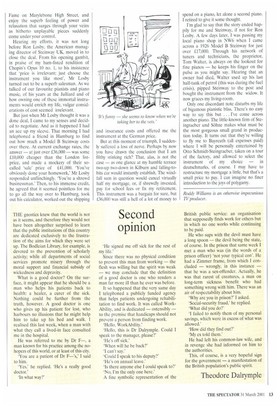Second opinion
THE gnostics knew that the world is not as it seems, and therefore they would not have been altogether surprised to learn that the public institutions of this country are dedicated exclusively to the frustration of the aims for which they were set up. The Bodleian Library, for example, is devoted to the prevention of scholarly activity; while all departments of social services promote misery through the moral support and financial subsidy of wickedness and depravity.
What is a good doctor? On the surface, it might appear that he should be a man who helps his patients back to health: a healer, a curer of the sick. Nothing could be further from the truth, however. A good doctor is one who gives up his patient for lost, who harbours no illusions that he might help him to take up his bed and walk. I realised this last week, when a man with what they call a lived-in face consulted me in the hospital.
He was referred to me by Dr F—, a man known for his practice among the nohopers of this world, or at least of this city.
`You are a patient of Dr F—'s,' I said to him.
'Yes,' he replied. 'He's a really good doctor.'
'In what way?' 'He signed me off sick for the rest of my life.'
Since there was no physical condition to prevent this man from working — the flesh was willing but the spirit was weak — we may conclude that the definition of a good doctor is one who renders a man far more ill than he ever was before.
It so happened that the very same day I telephoned a publicly funded agency that helps patients undergoing rehabilitation to find work. It was called WorkAbility, and is dedicated — ostensibly — to the premise that handicaps should not prevent a person from finding work.
'Hello, WorkAbility.'
'Hello, this is Dr Dalrymple. Could I speak to the manager, please?'
`He's off sick.'
'When will he be back?'
'I can't say.'
'Could I speak to his deputy?'
'He's on annual leave.'
'Is there anyone else I could speak to?' `No, I'm the only one here.'
A fine symbolic representation of the British public service: an organisation that supposedly finds work for others but in which no one works while continuing to be paid.
He who sups with the devil must have a long spoon — the devil being the state, of course. In the prison that same week I met a man who was (in the words of a prison officer) 'not your typical con'. He had a Zimmer frame, from which I concluded — wrongly, in this instance — that he was a sex-offender. Actually, he was that rarest of creatures, a man on long-term sickness benefit who had something wrong with him. There was an air of respectability about him.
'Why are you in prison?' I asked. 'Social-security fraud,' he replied. 'What did you do?'
'I failed to notify them of my personal savings, which were in excess of what was 'How did they find out?'
'My ex told them.'
He had left his common-law wife, and in revenge she had informed on him to the authorities.
This, of course, is a very hopeful sign for the government — a manifestation of the British population's public spirit.
Theodore Dalrymple


























































































 Previous page
Previous page